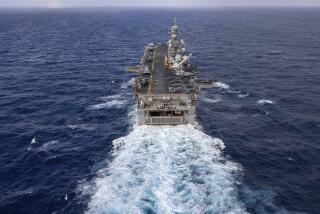Coast Guard’s global mission includes pirate duty
- Share via
THE COAST GUARD CUTTER BOUTWELL — When Capt. Kevin Cavanaugh guided his ship under the Golden Gate Bridge and into San Francisco Bay last week, it ended a voyage that marked two firsts for the veteran officer.
It was the first time he circumnavigated the globe -- a rare achievement for any sailor -- and the first time he tangled with suspected pirates.
But Coast Guard officials say the Boutwell’s recent six-month deployment -- in which its crew interrupted an attack on a merchant ship by suspected pirates off the coast of Somalia -- reveals a side of the maritime service that few know exists.
“Most people think of us as like the local fire department,” said Rear Admiral Timothy S. Sullivan. “Increasingly, we’re more like the cop on the beat.”
Sullivan pointed to the Coast Guard’s presence in far-flung waters around the globe, including the Bering Strait, the Caribbean and the Persian Gulf. Often working in cooperation with the U.S. and foreign navies, the Coast Guard has taken on law enforcement responsibilities that military services are either forbidden by law from carrying out or are ill-equipped to handle.
The Coast Guard’s roughly 43,000 active-duty personnel make it about the same size as the New York City Police Department. It’s a branch of the armed forces but operates under the Department of Homeland Security during peacetime. Its mission includes law enforcement, search and rescue operations and environmental protection.
On the Boutwell’s trip around the globe, the crew of the 378-foot cutter helped train foreign counterparts in combating drug smuggling, terrorism and piracy, among other things.
Crew members also engaged in humanitarian efforts, including a wetlands rehabilitation project in Malaysia and the refurbishment of a retirement home in India. On the diplomatic front, the cutter was the first American warship to visit a Libyan port in more than 40 years.
The highlight of the crew’s 41,000-nautical-mile voyage, however, came on April 28, when crew members monitored a distress call from a merchant ship in the Gulf of Aden, about 60 miles off the coast of Somalia.
The call came just three weeks after the crew of the Maersk Alabama had been taken hostage by pirates in an incident that made international headlines. That standoff ended when the ship’s captain was rescued by Navy SEALs.
When Cavanaugh heard the distress call from the Skaftafell, about 60 miles away, he dispatched the cutter’s helicopter, which was on scene in about 30 minutes. As the bright orange chopper arrived, the suspected pirate skiff peeled off and headed for shore.
The Boutwell set a course to cut it off before it reached Somali territorial waters. When the cutter was within about a mile of the fleeing skiff, the captain sent two Zodiac boats loaded with special boarding teams to detain the vessel.
Clutching an M-4 assault rifle, Mark Climacosa said, he could feel the adrenaline coursing through his veins as he sped toward the suspect boat. As he drew near, he could see some of the suspected pirate crew waving white T-shirts above their heads in apparent surrender.
Still, Climacosa recalled, the situation was tense as he stepped onto the 23-foot boat and looked into their eyes.
“They looked just as scared as we did,” the 11-year-Coast Guard veteran said. “They didn’t know what to expect. We didn’t know what to expect.”
Seven men were detained and briefly taken onboard the Boutwell. But the crew was released because no weapons were recovered and officials determined that any prosecution would be difficult at best. Coast Guard officials assumed that the weapons were thrown overboard during the pursuit, which lasted several hours.
Nonetheless, Cavanaugh said, “I have no doubt in my mind that they were attacking this vessel, trying to get on board.”
He added, “Once the pirates get on board, it’s ‘game over.’ You’ve got a hostage situation.”
Cavanaugh and other crew members said friends and family have expressed surprise that their Coast Guard duty has taken them to such places as Somalia.
“It’s kind of like ‘Whose coast are you guarding anyway?’ ” the captain said. But the 29-year-veteran said it’s become clear in recent years that “maritime security is no longer a local problem.”
Nearly three months after the incident in the Gulf of Aden, as the Boutwell cruised north up the California coast from San Pedro to its home port in Alameda, talk of the encounter had given way to giddiness over returning home.
The crew’s six-month deployment was about twice as long as Coast Guard crews are accustomed to serving. Sleeping in cramped, coffin-like “racks,” eating the same food all the time and being limited in their communication with friends and family back home had begun to take their toll.
Michael Weelmaa, a 23-year-old operations specialist from Chicago, said it required a certain “mental toughness” to be away so long from loved ones, including his fiancee.
“You have to go to sleep every night knowing they are lonely and there is nothing you can do about it,” Weelmaa said.
Though crew members are given secure e-mail accounts, he said he found that form of communication to be fraught with potential misunderstandings.
“I was always, like, what did she mean by this? What did she mean by that?” he recalled.
As his crew mates hung out on the fantail smoking cigarettes or looking over the railing at the occasional passing gray whales, Weelmaa said he was focused on passing under the Golden Gate Bridge on Wednesday morning.
“This will be the first time ever that I’ve had someone waiting at the pier,” he said. “And that’s a very big deal to me.”
-
More to Read
Sign up for Essential California
The most important California stories and recommendations in your inbox every morning.
You may occasionally receive promotional content from the Los Angeles Times.











